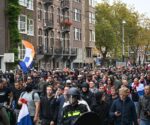Bodies pile up in streets of famous city as dozens killed by police | World | News
Gruesome piles of bodies have littered the streets of one of the world’s most famous cities after police launched a violent crackdown on a drug gang. The massive armed police raid on a drug gang embedded in low-income neighborhoods of Rio de Janeiro, Brazil, left at least 119 people dead.
The huge death toll drew protests in the tropical city after the raids on Tuesday turned parts of the Brazilian metropolis into resembling a war zone. Dozens of residents from favelas – the name for poorer slum neighbourhoods in Rio – have since gathered in front of the state’s government headquarters shouting “assassins” and waving Brazilian flags stained with red paint.
The protests came a day after Rio’s deadliest ever raid and hours after families and residents laid dozens of dead bodies on a street in one of the targeted communities to show the magnitude of the operation. Rio is famous around the globe for its stunning beaches and vibrant nightlife, including the world famous carnival.
The toll of 115 suspects and four policemen killed was an increase over what authorities originally said were 60 suspects dead in Tuesday’s raid by about 2,500 police and soldiers in the favelas of Penha and Complexo de Alemao.
Questions quickly arose about the death count and the state of the bodies, with reports of disfigurement and knife wounds. Brazil’s Supreme Court, prosecutors and lawmakers have asked Rio state Governor Claudio Castro to provide detailed information about the operation.
Barbara Barbosa, a domestic worker whose son was killed in a prior raid on the Penha complex of favelas, said it was a “massacre” and fellow resident and activist Rute Sales, 56, said: “Do we have a death sentence? Stop killing us.”
Penha local Elisangela Silva Santos, 50, said: “they can take them to jail, why kill them like this? Lots of them were alive and calling for help. Yes they’re traffickers, but they’re human.”
He said: “These individuals were in the woods, equipped with camouflage clothing, vests and weapons. Now many of them appeared wearing underwear or shorts, with no equipment, as if they had come through a portal and changed clothes.”
Earlier Wednesday, in the neighborhood of Penha, residents had surrounded many of the bodies, collected in trucks and displayed in a main square, and shouted “massacre” and “justice” before forensic authorities arrived to retrieve the remains.
The tally of suspects arrested stood at 113 — up from 81 cited previously, Curi said. The state government said some 90 rifles and more than a ton of drugs were seized.
Police and soldiers had launched the raid in helicopters, armored vehicles and on foot, targeting the Red Command gang. They drew gunfire and other retaliation from gang members, sparking scenes of chaos across the city on Tuesday. Schools in the affected areas shuttered, a local university canceled classes, and roads were blocked with buses used as barricades.
Many shops remained closed Wednesday morning in Penha, where local activist Raull Santiago said he was part of a team that found about 15 bodies before dawn.
Supreme Court Justice Alexandre de Moraes ordered Castro to provide information about the police operation and scheduled a hearing with the state governor and the heads of the military and civil police next Monday in Rio.
The Senate’s commission for human rights said it was asking for clarifications from the Rio state government. Meanwhile, Rio prosecutors requested that Castro provide detailed information about the operation and proof that there was no less harmful means of achieving its objectives.
Rio has been the scene of lethal police raids for decades. In March 2005, some 29 people were killed in Rio’s Baixada Fluminense region, while in May 2021, 28 were killed in the Jacarezinho favela.
But the scale and lethality of Tuesday’s operation are unprecedented. Non-governmental organisations and the UN human rights body quickly raised concerns over the high number of reported fatalities and called for investigations.
“We fully understand the challenges of having to deal with violent and well-organised groups such as Red Command,” said UN Human Rights Spokesperson Marta Hurtado said.
But Brazil must “break this cycle of extreme brutality and ensure that law enforcement operations comply with international standards regarding the use of force,” she said, adding that the body was calling for full-fledged policing reform.
Late on Wednesday, President Luiz Inácio Lula da Silva said on X that he had instructed the justice minister and director-general of Federal Police to meet Castro for a meeting in Rio.









